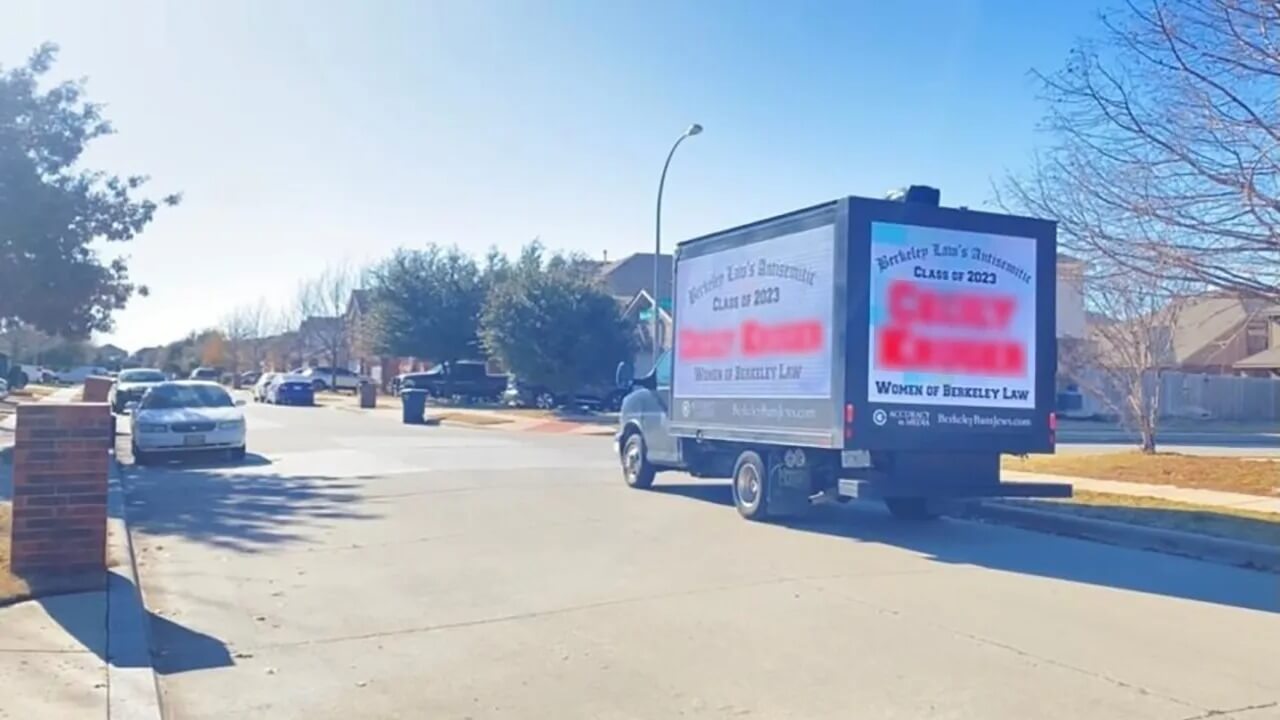Activists parked ‘antisemite’ trucks at the homes of Berkeley Law students
The conservative group Accuracy in Media is using a billboard truck to target Berkeley Law students who support a ban on pro-Israel speakers

Graphic by Angelie Zaslavsky
This article originally appeared on J. The Jewish News of Northern California, and was reprinted here with permission.
The conservative watchdog group Accuracy in Media, whose motto is “On the front lines of the culture war,” recently escalated its attacks on Berkeley Law students who supported bans on Zionist speakers — taking the fight to their family homes in another state.
The Washington, D.C.–based nonprofit, which reported about $2.1 million in revenue last year, seeks to combat what it views as bias in the mainstream press.
In recent months, it has thrust itself into the middle of the contentious debate on Israel and Zionism at UC Berkeley, a controversy that has captured the attention of the national media. In the process, AIM has alienated itself from mainstream pro-Israel Jewish groups such as the Anti-Defamation League, and has drawn stark criticism from Jewish campus leaders who say its tactics are counterproductive.
On Jan. 13, Accuracy in Media — which has ties to the gonzo right-wing investigative group Project Veritas — announced it had commissioned a mobile billboard truck emblazoned with messages calling out two students who allegedly supported bans against Zionist speakers.
This time, however, rather than driving its message around Berkeley as it did in October, the organization drove a truck through the students’ neighborhoods at their homes in Plano, Texas, and Fort Worth. AIM reported the activity, publishing a photo of a truck parked in a suburban neighborhood. Large block letters named the students, dubbing them “Berkeley Law’s Antisemite.”
The stunt was the latest by AIM to make its mark on the Berkeley Law controversy, which stems from a move in August by nine affinity groups within the law school to ban outside speakers who support Israel and Zionism. As a few more affinity groups followed suit during the 2022 fall semester, Jewish law students who support Israel said they felt ostracized and excluded.
AIM’s president, Adam Guillette, told J. in October that his organization is motivated by growing antisemitism on college campuses, which he called “exceptionally disturbing.” Guillette also conducted on-the-scene interviews with Berkeley students, which he published on YouTube.
“Students are always proud to promote their radical views on campus, but when Accuracy in Media exposes them, they don’t want their view publicized,” Guillette wrote in a Jan. 9 tweet. “Funny — that’s not how it works!”
Guillette is a former vice president for development at Project Veritas, which gained notoriety in the Obama era publishing hidden-camera “sting” videos targeting groups such as Planned Parenthood, NPR and the Washington Post. Critics said the videos were deceptively edited; the organization has been embroiled in lawsuits, and a federal jury found in September it had fraudulently misrepresented itself and violated wiretapping laws. The group was ordered to pay $120,000 in damages.
In October, Berkeley’s campus Hillel and the ADL criticized AIM’s mobile billboard campaign after a box truck emblazoned with an image of Hitler and the message “All in favor of banning Jews raise your right hand” rolled through town. Weeks later, AIM parked its mobile billboards outside of the Berkeley Law building, flashing the names of students it believes were responsible for the ban of pro-Israel speakers.
At the time, Berkeley Hillel called the Hitler truck “disturbing” and said it had subjected “Jewish students to additional fear and trauma.” The ADL added in a tweet: “The addition of more antisemitism, like using Hitler imagery to score cheap rhetoric points, only trivializes the memories of the six million.”
Berkeley Law officials did not immediately respond to a request for comment.
In an earlier interview, Berkeley Law Dean Erwin Chemerinsky — a Jew who has been critical of the Zionist speaker bans but has defended students’ legal right to support them — called the mobile billboards “despicable” and said the university was “exploring whether there’s any action that can be taken” against AIM.
Guillette has taken issue with the characterization of his organization as right-wing or conservative, saying its mission is investigative journalism, exposing corruption and fostering a “healthy skepticism” of the mainstream media.
In a statement Tuesday, the ADL’s San Francisco office criticized both AIM and the student groups that instituted the Zionist speaker bans, which include Women of Berkeley Law, the Muslim Student Association, the Queer Caucus and roughly a dozen others.
Those groups “are already fostering an antisemitic atmosphere among students with their ill-informed no-Zionist speakers policy,” read the statement from Teresa Drenick, ADL deputy regional director. “Stunts like these mobile billboards targeting student leaders — and now their families — only serve to inflame an already wrought situation.
“By contrast, ADL will continue working productively with campus leaders to support Jewish and pro-Israel Berkeley Law students and ensure the campus climate is safe and welcoming to all,” Drenick wrote.






















